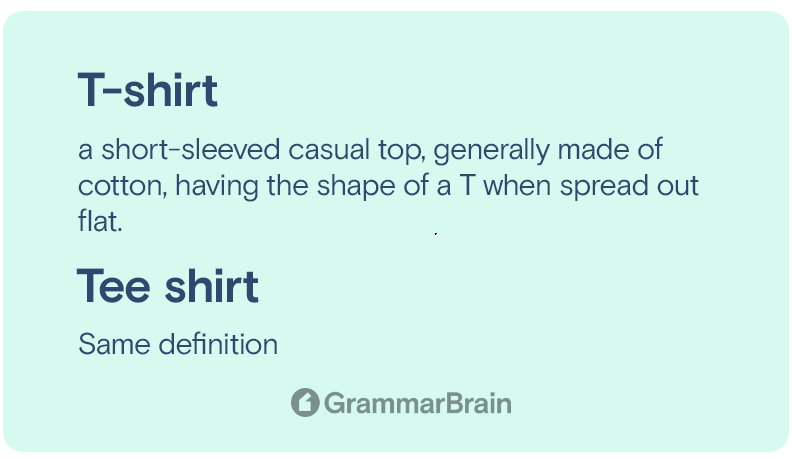Is it t-shirt or tee shirt? It can get very easy to get thrown off by English sometimes. Words that mean the same are sometimes spelled or written so differently that one wonders which or what should be the go-to spelling.
There are multiple ways in which one can find T-shirts spelled. However, the two most common ways are ‘T-shirt’ and ‘Tee shirt’. While both mean the same, common writing practices have certainly popularized one over the other.

What is the difference between a T-shirt and a Tee shirt?
While the difference is irrelevant in spoken English, written English sometimes ascribes to different variants of the same word. T-shirt is a noun. It is also a very common component of casual attire all over the world. Some example sentences using the word T-shirt are:
- Sarah’s mom accidentally gave away her favorite red T-shirt in the donation pile.
- My first thought when thinking about comfort clothing is a T-shirt and a pair of shorts.
- Dylan usually just buys a pack of T-shirts in different colors.
On the other hand, while it means the same tee shirt is very rarely used in print media. While both sound and mean the same, one will find the usage of the word ‘tee shirt’ a lot less in print than T-shirt.
All the sentences mentioned above, in theory, can also be written by replacing ‘T-shirt’ with ‘Tee shirt’. They would all still mean the same.
| Word | Definition |
| T-shirt | a short-sleeved casual top, generally made of cotton, having the shape of a T when spread out flat. |
| Tee shirt | a short-sleeved casual top, generally made of cotton, having the shape of a T when spread out flat. |
Meaning of T-shirt
A T-shirt is a garment that has been worn by both men and women for a long time in the history of clothing. It derives its name from the ‘T’ shape that it resembles. It is considered to be more informal over a shirt and can be both long or short-sleeved.
Typically, it is short-sleeved and paired with jeans or pants to give the outfit a more informal, comfortable look.
How is a T-shirt different from a shirt?
There is quite a substantial difference between both these popular items of clothing. Some of it is:
- T-shirts are usually considered casual attire while shirts are the preferred form of clothing when choosing to go somewhere formal.
- T-shirts can come in different necklines while shirts usually have a standard neckline with collars.
- T-shirts can be experimental with buttons and may or may not have them, shirts always have buttons all the way down.
- T-shirts can come in different sleeve variants like short, three-fourth, or long. Shirts, typically, are either long-sleeved or sometimes short-sleeved.
Different ways to write T-shirt
The word ‘T-shirt’ can be written in many different ways. Using a hyphen, it is written as ‘T-shirt’ or t-shirt’. Using capitalization it can be written as ‘T-shirt’ or’ T-shirt’. The writing-based speech also spells it as ‘tee shirt’ or ‘tee-shirts’.
However, in slang, it is common to use the word ‘Tee’ to refer to T-shirts. While all the ways to write it are technically correct, written English encourages the use of ‘T-shirt’ as the most commonly accepted spelling of the said word.
Conclusion
In conclusion, in deciding the correct usage between ‘T-shirts’ and ‘tee shirts, there is consensus amongst the writing and printing industry. While both words mean the same, it might be a safer choice to opt for ‘T-shirt’ over ‘Tee shirt’ while writing.
Inside this article
Fact checked:
Content is rigorously reviewed by a team of qualified and experienced fact checkers. Fact checkers review articles for factual accuracy, relevance, and timeliness. Learn more.
Core lessons
Glossary
- Abstract Noun
- Accusative Case
- Anecdote
- Antonym
- Active Sentence
- Adverb
- Adjective
- Allegory
- Alliteration
- Adjective Clause
- Adjective Phrase
- Ampersand
- Anastrophe
- Adverbial Clause
- Appositive Phrase
- Clause
- Compound Adjective
- Complex Sentence
- Compound Words
- Compound Predicate
- Common Noun
- Comparative Adjective
- Comparative and Superlative
- Compound Noun
- Compound Subject
- Compound Sentence
- Copular Verb
- Collective Noun
- Colloquialism
- Conciseness
- Consonance
- Conditional
- Concrete Noun
- Conjunction
- Conjugation
- Conditional Sentence
- Comma Splice
- Correlative Conjunction
- Coordinating Conjunction
- Coordinate Adjective
- Cumulative Adjective
- Dative Case
- Determiner
- Declarative Sentence
- Declarative Statement
- Direct Object Pronoun
- Direct Object
- Diction
- Diphthong
- Dangling Modifier
- Demonstrative Pronoun
- Demonstrative Adjective
- Direct Characterization
- Definite Article
- Doublespeak
- False Dilemma Fallacy
- Future Perfect Progressive
- Future Simple
- Future Perfect Continuous
- Future Perfect
- First Conditional
- Irregular Adjective
- Irregular Verb
- Imperative Sentence
- Indefinite Article
- Intransitive Verb
- Introductory Phrase
- Indefinite Pronoun
- Indirect Characterization
- Interrogative Sentence
- Intensive Pronoun
- Inanimate Object
- Indefinite Tense
- Infinitive Phrase
- Interjection
- Intensifier
- Infinitive
- Indicative Mood
- Participle
- Parallelism
- Prepositional Phrase
- Past Simple Tense
- Past Continuous Tense
- Past Perfect Tense
- Past Progressive Tense
- Present Simple Tense
- Present Perfect Tense
- Personal Pronoun
- Personification
- Persuasive Writing
- Parallel Structure
- Phrasal Verb
- Predicate Adjective
- Predicate Nominative
- Phonetic Language
- Plural Noun
- Punctuation
- Punctuation Marks
- Preposition
- Preposition of Place
- Parts of Speech
- Possessive Adjective
- Possessive Determiner
- Possessive Case
- Possessive Noun
- Proper Adjective
- Proper Noun
- Present Participle
- Prefix
- Predicate



